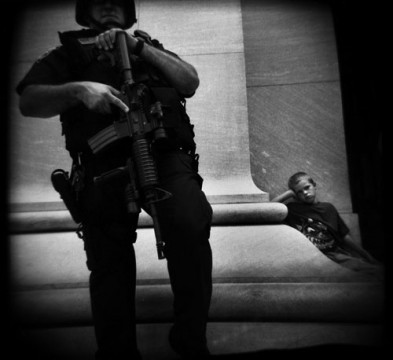The Global War on Terrorism is the common term for what the George W. Bush administration perceived or presented as the military, political, legal and ideological conflict against Islamic terrorism and refers to operations by the United States and some of its allies since the September 11, 2001 attacks.

A New York City police officer patrols the New York Stock Exchange grounds in response to the heightened terror attack warnings. Copyright © Marvi Lacar/Getty.
This language became the antecedent to a real declared war in Iraq—based on flawed intelligence reports of Al Quaida links to the Hussein regime and false reports about Iraqi weapons of mass destruction. In addition it became the overarching metaphor used to justify US unilateralism and violation of the Geneva Conventions. At the onset of the War on Terror, only 35 days after the September 11 attacks, the Federal Bureau of Investigation announced it was looking at “alternative interrogation techniques” that might include administering truth serums or renditioning prisoners to foreign countries with “more rigorous and brutal” methods of interrogation than allowed under the anti torture treaties to which the US was a signatory. Later the US itself defined forms of torture as “enhanced interrogation techniques.” Critics view these measures as a clear expansion of US power beyond the bounds of International rule of law.